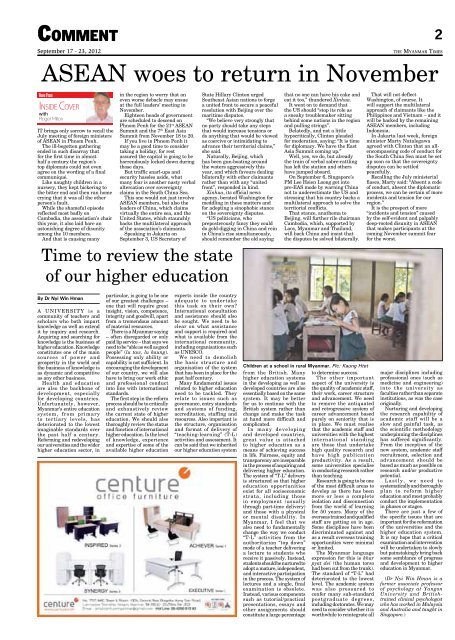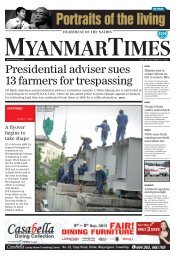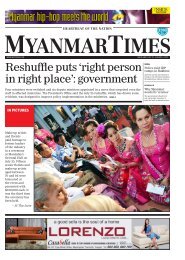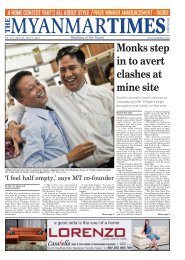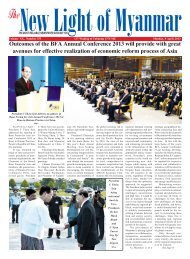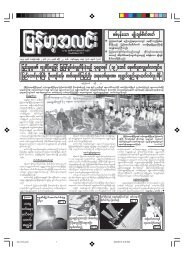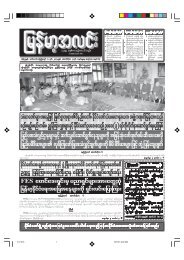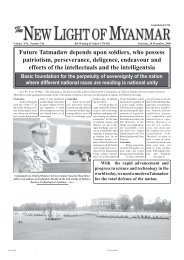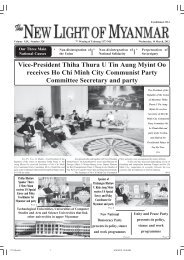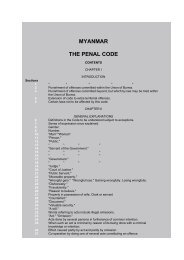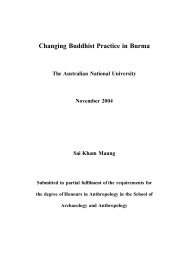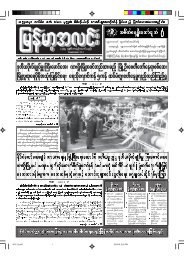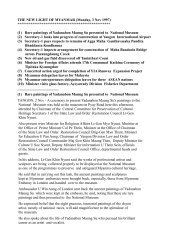'Help us build a new Myanmar' - Online Burma Library
'Help us build a new Myanmar' - Online Burma Library
'Help us build a new Myanmar' - Online Burma Library
You also want an ePaper? Increase the reach of your titles
YUMPU automatically turns print PDFs into web optimized ePapers that Google loves.
Comment<br />
September 17 - 23, 2012<br />
By Dr Nyi Win Hman<br />
A UNIVERSITY is a<br />
community of teachers and<br />
scholars who both impart<br />
knowledge as well as extend<br />
it by inquiry and research.<br />
Acquiring and searching for<br />
knowledge is the b<strong>us</strong>iness of<br />
higher education. Knowledge<br />
constitutes one of the main<br />
sources of power and<br />
prosperity in the world and<br />
the b<strong>us</strong>iness of knowledge is<br />
as dynamic and competitive<br />
as any other b<strong>us</strong>iness.<br />
Health and education<br />
are also the backbone of<br />
development, especially<br />
for developing countries.<br />
Unfortunately, however,<br />
Myanmar’s entire education<br />
system, from primary<br />
to tertiary levels, has<br />
deteriorated to the lowest<br />
imaginable standards over<br />
the past half a century.<br />
Reforming and redeveloping<br />
our universities and the wider<br />
higher education sector, in<br />
particular, is going to be one<br />
of our greatest challenges –<br />
one that will require great<br />
insight, vision, competence,<br />
integrity and goodwill, apart<br />
from a tremendo<strong>us</strong> amount<br />
of material resources.<br />
There is a Myanmar saying<br />
– often disregarded or only<br />
paid lip service – that says we<br />
need to be “able as well as good<br />
people” (lu taw, lu kaung).<br />
Possessing only ability or<br />
capability is not sufficient. In<br />
encouraging the development<br />
of our country, we will also<br />
have to bring our work ethic<br />
and professional conduct<br />
into line with international<br />
standards.<br />
The first step in the reform<br />
process should be to critically<br />
and exha<strong>us</strong>tively review<br />
the current state of higher<br />
education. We should also<br />
thoroughly review the stat<strong>us</strong><br />
and function of international<br />
higher education. Is the level<br />
of knowledge, experience<br />
and expertise of some of the<br />
available higher education<br />
experts inside the country<br />
adequate to undertake<br />
this task on their own?<br />
International consultation<br />
and assistance should also<br />
be sought. We need to be<br />
clear on what assistance<br />
and support is required and<br />
what is available from the<br />
international community,<br />
including organisations such<br />
as UNESCO.<br />
We need to demolish<br />
the basic structure and<br />
organisation of the system<br />
that has been in place for the<br />
past half century.<br />
Many fundamental issues<br />
related to higher education<br />
need to be tackled. They<br />
relate to issues such as<br />
governance, entry standards<br />
and systems of funding,<br />
accreditation, staffing and<br />
resources. Also important is<br />
the structure, organisation<br />
and format of delivery of<br />
“teaching-learning” (T-L)<br />
activities and assessment. It<br />
can be said that we inherited<br />
our higher education system<br />
from the British. Many<br />
higher education systems<br />
in the developing as well as<br />
developed countries are also<br />
essentially based on the same<br />
system. It may be better<br />
for <strong>us</strong> to continue with the<br />
British system rather than<br />
change and make the task<br />
at hand more difficult and<br />
complicated.<br />
In many developing<br />
and developed countries,<br />
great value is attached<br />
to higher education as a<br />
means of achieving success<br />
in life. Fairness, equity and<br />
transparency are inseparable<br />
in the process of acquiring and<br />
delivering higher education.<br />
The system of “T-L” delivery<br />
is structured so that higher<br />
education opportunities<br />
exist for all socioeconomic<br />
strata, including those<br />
in employment (<strong>us</strong>ually<br />
through part-time delivery)<br />
and those with a physical<br />
or mental disability. In<br />
Myanmar, I feel that we<br />
also need to fundamentally<br />
change the way we conduct<br />
“T-L” activities from the<br />
authoritarian “top down”<br />
mode of a teacher delivering<br />
a lecture to students who<br />
receive it passively. Instead,<br />
students should be nurtured to<br />
adopt a mature, independent,<br />
and interactive participation<br />
in the process. The system of<br />
lectures and a single, final<br />
examination is obsolete.<br />
Instead, vario<strong>us</strong> components<br />
such as tutorial/practical<br />
presentations, essays and<br />
other assignments should<br />
constitute a large percentage<br />
to determine success.<br />
The other important<br />
aspect of the university is<br />
the quality of academic staff,<br />
their work, career structure<br />
and advancement. We need<br />
to remove the antiquated<br />
and retrogressive system of<br />
career advancement based<br />
purely on seniority that is<br />
in place. We m<strong>us</strong>t realise<br />
that the academic staff and<br />
universities with the highest<br />
international standing<br />
are those that undertake<br />
high quality research and<br />
have high publication<br />
productivity. As a result,<br />
some universities specialise<br />
in conducting research rather<br />
than teaching.<br />
Research is going to be one<br />
of the most difficult areas to<br />
develop as there has been<br />
more or less a complete<br />
isolation and disconnection<br />
from the world of learning<br />
for 50 years. Many of the<br />
overseas trained and qualified<br />
staff are getting on in age.<br />
Some disciplines have been<br />
discriminated against and<br />
as a result overseas training<br />
opportunities were minimal<br />
or limited.<br />
The Myanmar language<br />
expression for this is khar<br />
pyat dei (the human torso<br />
had been cut from the trunk).<br />
The standard of “T-L” had<br />
deteriorated to the lowest<br />
level. The academic system<br />
was also pressured to<br />
confer many sub-standard<br />
postgraduate degrees,<br />
including doctorates. We may<br />
need to consider whether it is<br />
worthwhile to reintegrate all<br />
2<br />
the MyanMar tiMes<br />
ASEAN woes to return in November<br />
AsiAn Foc<strong>us</strong><br />
InsIde Cover<br />
with<br />
Roger Mitton<br />
IT brings only sorrow to recall the<br />
July meeting of foreign ministers<br />
of ASEAN in Phnom Penh.<br />
The ill-begotten gathering<br />
ended in such disarray that<br />
for the first time in almost<br />
half a century the region’s<br />
top diplomats could not even<br />
agree on the wording of a final<br />
communiqué.<br />
Like naughty children in a<br />
nursery, they kept bickering to<br />
the bitter end and then ran home<br />
crying that it was all the other<br />
person’s fault.<br />
While the shameful episode<br />
reflected most badly on<br />
Cambodia, the association’s chair<br />
this year, it also laid bare an<br />
astonishing degree of disunity<br />
among the 10 members.<br />
And that is ca<strong>us</strong>ing many<br />
in the region to worry that an<br />
even worse debacle may ensue<br />
at the full leaders’ meeting in<br />
November.<br />
Eighteen heads of government<br />
are scheduled to descend on<br />
Phnom Penh for the 21 st ASEAN<br />
Summit and the 7 th East Asia<br />
Summit from November 18 to 20.<br />
If you live in Phnom Penh it<br />
may be a good time to consider<br />
taking a holiday, for rest<br />
assured the capital is going to be<br />
horrendo<strong>us</strong>ly locked down during<br />
those days.<br />
But traffic snarl-ups and<br />
security hassles aside, what<br />
many fear is another nasty verbal<br />
altercation over sovereignty<br />
claims in the South China Sea.<br />
This one would not j<strong>us</strong>t involve<br />
ASEAN members, but also the<br />
leaders of China, which claims<br />
virtually the entire sea, and the<br />
United States, which staunchly<br />
backs the multilateral approach<br />
of the association’s claimants.<br />
Speaking in Jakarta on<br />
September 3, US Secretary of<br />
Time to review the state<br />
of our higher education<br />
State Hillary Clinton urged<br />
Southeast Asian nations to forge<br />
a united front to secure a peaceful<br />
resolution with Beijing over the<br />
maritime disputes.<br />
“We believe very strongly that<br />
no party should take any steps<br />
that would increase tensions or<br />
do anything that would be viewed<br />
as coercive or intimidating to<br />
advance their territorial claims,”<br />
she said.<br />
Naturally, Beijing, which<br />
has been gun-boating around<br />
the waters aggressively this<br />
year, and which favours dealing<br />
bilaterally with other claimants<br />
rather than with any “united<br />
front”, responded in kind.<br />
Xinhua, its official <strong>new</strong>s<br />
agency, berated Washington for<br />
meddling in these matters and<br />
for adopting a sinophobic stance<br />
on the sovereignty disputes.<br />
“US politicians, who<br />
prepostero<strong>us</strong>ly fancy they could<br />
do gold-digging in China and rein<br />
in China’s rise simultaneo<strong>us</strong>ly,<br />
should remember the old saying<br />
that no one can have his cake and<br />
eat it too,” thundered Xinhua.<br />
It went on to demand that<br />
the US should “stop its role as<br />
a sneaky troublemaker sitting<br />
behind some nations in the region<br />
and pulling strings”.<br />
Belatedly, and not a little<br />
hypocritically, Clinton pleaded<br />
for moderation, saying: “It is time<br />
for diplomacy. We have the East<br />
Asia Summit coming up.”<br />
Well, yes, we do, but already<br />
the train of verbal sabre-rattling<br />
has left the station and others<br />
have jumped aboard.<br />
On September 6, Singapore’s<br />
PM Lee Hsien Loong got into<br />
pre-EAS mode by warning China<br />
not to underestimate the US and<br />
stressing that his country backs a<br />
multilateral approach to solve the<br />
territorial conflicts.<br />
That stance, anathema to<br />
Beijing, will further rile chairman<br />
Cambodia, which, supported by<br />
Laos, Myanmar and Thailand,<br />
will back China and insist that<br />
the disputes be solved bilaterally.<br />
Children at a school in rural Myanmar. Pic: Kaung Htet<br />
That will not deflect<br />
Washington, of course. It<br />
will support the multilateral<br />
approach of claimants like the<br />
Philippines and Vietnam – and it<br />
will be backed by the remaining<br />
ASEAN members, including<br />
Indonesia.<br />
In Jakarta last week, foreign<br />
minister Marty Natalegawa<br />
agreed with Clinton that an allencompassing<br />
code of conduct for<br />
the South China Sea m<strong>us</strong>t be set<br />
up soon so that the sovereignty<br />
disputes can be settled<br />
peacefully.<br />
Recalling the July ministerial<br />
fiasco, Marty said: “Absent a code<br />
of conduct, absent the diplomatic<br />
process, we can be certain of more<br />
incidents and tension for our<br />
region.”<br />
It is the prospect of more<br />
“incidents and tension” ca<strong>us</strong>ed<br />
by the self-evident and palpably<br />
deep-rooted disunity in ASEAN<br />
that makes participants at the<br />
coming November summit fear<br />
for the worst.<br />
major disciplines including<br />
professional ones (such as<br />
medicine and engineering)<br />
into the university as<br />
faculties rather than separate<br />
institutions, as was the case<br />
originally.<br />
Nurturing and developing<br />
the research capability of<br />
academic staff will be a<br />
slow and painful task, as<br />
the scientific methodology<br />
underpinning the disciplines<br />
has suffered significantly.<br />
From the inception of the<br />
<strong>new</strong> system, academic staff<br />
recruitment, selection and<br />
advancement should be<br />
based as much as possible on<br />
research and/or productive<br />
potential.<br />
Lastly, we need to<br />
systematically and thoroughly<br />
plan to reform higher<br />
education and most probably<br />
conduct the implementation<br />
in phases or stages.<br />
There are j<strong>us</strong>t a few of<br />
the specific issues that are<br />
important for the reformation<br />
of the universities and the<br />
higher education system.<br />
It is my hope that a critical<br />
examination and intervention<br />
will be undertaken to slowly<br />
but painstakingly bring back<br />
some semblance of progress<br />
and development to higher<br />
education in Myanmar.<br />
(Dr Nyi Win Hman is a<br />
former associate professor<br />
of psychology at Yangon<br />
University and Britishtrained<br />
clinical psychologist<br />
who has worked in Malaysia<br />
and A<strong>us</strong>tralia and taught in<br />
Singapore.)


